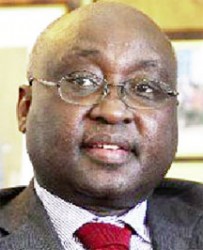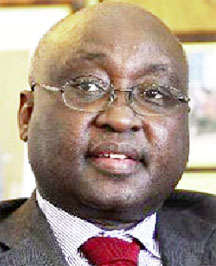JOHANNESBURG, (Reuters) – Africa is rising not only on the growth charts of economists.
The continent that was a byword for poverty, chaos and bloodshed only a few decades ago, providing a media feast of famines and wars, is slowly but steadily notching up gains on the democracy scorecard too.
Last month’s generally peaceful Kenyan presidential election – and the Supreme Court process that confirmed Uhuru Kenyatta’s narrow win – confounded pundits’ predictions that East Africa’s biggest economy would tumble back into the same inter-tribal violence which bloodied a 2007 vote.
The Kenyan ballot, following a line of hotly-contested but broadly smooth elections last year in Senegal, Sierra Leone and Ghana, has bolstered what many see as a spreading embrace of multi-party democracy in Africa.
Combined with better economic management by many governments and a fast-growing population of young workers and consumers, this improving political maturity will underpin expected GDP growth for Sub-Saharan Africa of five percent or more this year.
“If you peel back ‘Africa Rising’, it is not just growth rates,” said John Stremlau, Vice President for Peace Programs at the Atlanta-based Carter Center and a veteran observer of African elections, including the most recent Kenyan one.
In a December outlook for Sub-Saharan Africa, Fitch Ratings called the vote in Kenya, seen as a political and economic anchor in East Africa, an “important inflection point”.

Despite technical glitches and some localised violence, Kenya passed this test without repeating the 2007-2008 bloodletting that killed more than 1,200 people, helping to mend its image as one of Africa’s most stable democracies.
Standard Bank economist Simon Freemantle said the Kenya vote added to a list of recent African elections where incumbent leaders accepted defeat, such as Zambia’s Rupiah Banda in 2011 and Senegal’s Abdoulaye Wade in 2012, or where losing challengers heeded the verdict of the ballot box and the courts.
“The momentum, the general thrust is absolutely positive … these are all examples from very different countries … different geographically, historically, culturally, and all showing signs of that maturation,” Freemantle told Reuters.
He cautioned that the permeation of electoral democracy across a vast and varied continent was not uniform, as Africa has not completely shaken off some of its old demons.
“The African narrative in many ways is not a single-track story, it’s very patchy,” he said.
A rebel takeover in Central African Republic last month became the latest flashpoint of regional instability. This sucked in South Africa which suffered a blow to its ambitions to be the continental superpower by losing 13 soldiers on a military training mission killed in confused fighting there.
France’s robust military intervention in its former Sahel colony Mali in January repulsed a mix of al-Qaeda allied rebels, but at the same time raised fears of an Islamist jihadist backlash in North and West Africa, not least in Nigeria where the government is battling the northern Boko Haram insurgency.
Democratic Republic of Congo’s east remains a political and ethnic tinderbox and a surprise attack by pro-secessionist rebels in March on the second city and mining hub of Lubumbashi added to the instability woes of the central African giant.
A raid by opposition Renamo supporters in Mozambique on Thursday, killing four policemen, may also worry mining firms exploring huge coal and natural gas reserves.
Nevertheless, most Africa watchers say the continent has unquestionably moved on from the time when government change was more likely to come from the point of a gun than a ballot box.
In its 2012 “Africa attractiveness” survey, Ernst & Young recalled that between 1960, the milestone year for African independence, and 1990 there was only one instance of an African leader or ruling party being voted out of office.
The continent gained an unenviable reputation for bloody coups, kleptocratic “Big Men” dictators, and brutal civil wars fought over resources and often featuring child soldiers – an image of chaos and conflict that has endured over the years.
“The perception is that Africa is often more politically unstable, more corrupt and more challenging to do business than anywhere else in the world,” the Ernst & Young survey said.
But it argued the facts now “tell a different story,” noting that most African countries have transitioned, or are transitioning toward, some form of participatory democracy.
In its 2012 Democracy index, the Economist Intelligence Unit said elections had become a “normal occurrence” in Sub-Saharan Africa, while coups had declined sharply.
The EIU listed 22 Sub-Saharan African states classifying above Russia on its index, while 34 were listed above China.
But it noted that despite more infrequent coups, “conflict, failed government and human rights abuses remained widespread”.
African Development Bank president Donald Kaberuka believes Africa, written off for decades as a hopeless continent always begging for aid, has now reached a milestone moment.
“It is not simply a tipping point in the fortunes of Africa, it is a tipping point in how the rest of the world looks at Africa as well,” he told Reuters at a summit of BRICS emerging powers last week held for the first time in Africa.
As China, India, Brazil and Russia increasingly court Africa, he says this is changing perceptions of the region from “a continent of problems” to a source of business opportunities in infrastructure, financial services, and agriculture.
Sudan-born telecoms entrepreneur Mo Ibrahim, who has created a $5 million annual prize to reward good governance in Africa, points to the record 86 percent Kenya election turnout as a sign Africans are embracing electoral democracy as a viable force. This contrasts with low turnouts in older western democracies.
Tipping the balance towards improving governance, Ibrahim said, was a critical mass of Africa’s young population who were better educated and better informed than their parents.
“They ask ‘Why are we like this? Why aren’t we like the Europeans and Americans, why not like China?’,” he added.
Standard Bank’s Freemantle said this increasingly vocal “voice and agency of the people” was being strengthened by growing urbanisation and access to technology across Africa.
“These dynamics for me are all suggesting that political systems are having to be more nimble and relevant,” he said.
BEWARE EXCLUSION
But Africa’s burgeoning growth, swelling population and blossoming wealth – for some – has a potential weakness in the widening inequality gap in most African societies today.
If the continent’s fast-growing young urbanised populations feel excluded from the material benefits of an economically rising Africa, or if these spoils are appropriated by ruling elites, then this risks touching off the same kind of social explosion that caused the “Arab Spring” in North Africa.
“We have to pay attention to inclusion. We cannot leave people behind,” Ibrahim said.
He urged governments to turn the economic boom into stable, lasting prosperity by investing in human development, education and infrastructure.
Freemantle also warned that African mega-cities like Lagos could become dangerous “pressure cookers” if visible disparities in wealth were not tackled by national and local authorities.
Nevertheless, AfDB’s Kaberuka sees Africa in a “bullish mood” as the developed West struggles with economic problems.
Clearly, as France’s intervention in Mali shows, there are still limits to this new African spirit of self assertiveness, and capacity in security and defence is certainly one of them.
But Kaberuka says Africa can start by solving its own problems with its own resources. His AfDB is planning to launch an infrastructure bond in the coming months to raise up to $22 billion for investments in targeted infrastructure projects, to be bought by reserves held by member nations’ central banks.
“Africa is coming of age,” he said.

